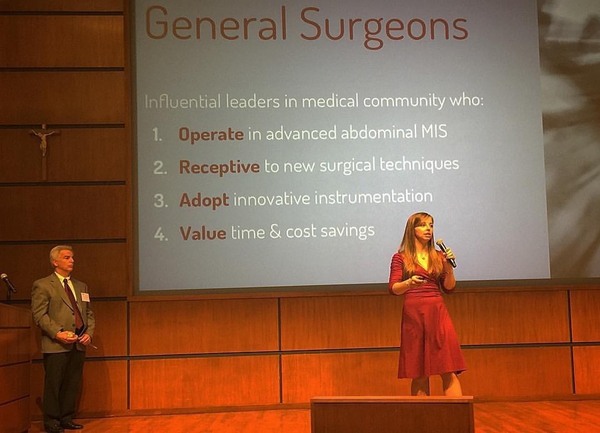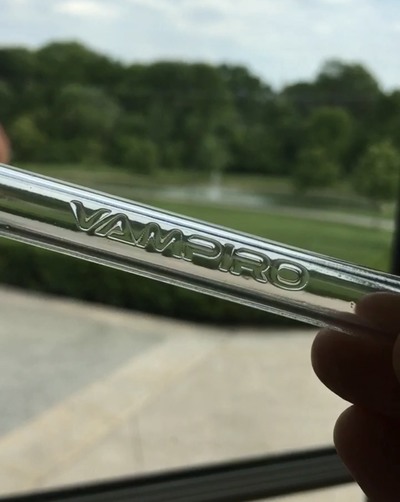
Though Vampiro’s name might bring about images of vampires, the medical device’s purpose means less operating room time and fewer surgical site infections for patients.
But, like vampires, Vampiro is designed for sucking blood — as well as other bodily fluids during laparoscopic surgery.
Thanks to Notre Dame Law School’s Intellectual Property and Entrepreneurship Clinic, the father-daughter team behind Vampiro was able to obtain a patent and get the device out on the market, helping surgeons work with patients across the country.
Notre Dame alumnus Steven Santanello ’77, who is a surgeon in Ohio, invented Vampiro. The idea came to him during a 2 a.m. appendectomy he was performing. The procedure was complex and resulted in a large amount of fluid in the patient’s body cavity, which has the potential to cause post-surgery complications for patients.
 The Vampiro device, pictured here, helps with poole suction during laparoscopic procedures. / Photo provided.
The Vampiro device, pictured here, helps with poole suction during laparoscopic procedures. / Photo provided.
Dr. Santanello developed the device with his daughter Abbey Santanello ’15, ’16 M.S., who worked on the project while earning her master’s degree through Notre Dame’s ESTEEM program. She explained that there is nothing else quite like Vampiro on the market, in terms of suction of this type for laparoscopic surgery. Vampiro — named after the Italian word for “vampire,” as the Santanellos are Italian-American — is meant to provide “poole suction,” or suction of larger amounts of blood and bodily fluids that “spot suction” tools can’t handle. This can help mitigate the need for a surgeon to open up a laparoscopic patient if something happens during surgery resulting in a larger amount of fluid, she explained.
This was the Santanello family’s first foray into anything like this, so they turned the IP Clinic at Notre Dame Law School for help. Clinic Director Jodi Clifford and the clinic’s student interns proved invaluable, Abbey Santanello said, and made their first foray into the world of medical device patents both successful and educational.
“Abbey and Steve couldn’t have been better clients to work with,” said Adam Kwon ’19 J.D., one of the two most recent Notre Dame Law students to work on the case. “Working in the clinic on cases like this one taught me a lot of lessons and gave me exposure to new tasks. It prepared me more for when I head to my firm in September.”
Notre Dame Law School’s IP Clinic is certified by the U.S. Patent and Trademark Office to practice in both patent and trademark matters. This gives students unique opportunities to interact with the PTO. For example, in prosecuting Vampiro’s patent application, Kwon was able to conduct an interview with the patent examiner. Typically, only registered patent agents or patent attorneys are permitted to conduct such interviews, but many of the clinic students have interacted directly with PTO representatives due to the clinic’s certification. Kwon’s own personal certification as a patent agent, that he achieved at the start of his 1L year, is also rare for a student.
“Clinical work gives students the opportunity to work directly with real world clients and in this case a federal agency,” Clifford said. “It’s a rare chance to take on the mantle and responsibility of being an attorney representing your client while still in law school and with the supervision and backing of a practicing attorney.”
Michael Benson ’19 J.D., another student who worked with the Santanello patent, said it’s hard to get this kind of patent experience during law school, even during summer internships.
“Experiential learning like this gives you another perspective,” Benson said. “Most of my 2L and 3L years were spent in experiential learning courses. It’s a lot of practical experience, and something both I and potential employers appreciate.”
Benson said Notre Dame Law School’s IP Clinic was one of the major reasons he chose to come here. He also appreciates that Clifford was a practicing patent attorney before she joined the Law School to direct the IP Clinic.
“The fact that Notre Dame Law has a clinic that does both patent and trademark work is pretty unique,” Benson said. “Professor Clifford’s patent experience and background is also valuable. Not a lot of other law schools have someone with her level of experience to run the clinic.”
Originally published by at law.nd.edu on July 25, 2019.